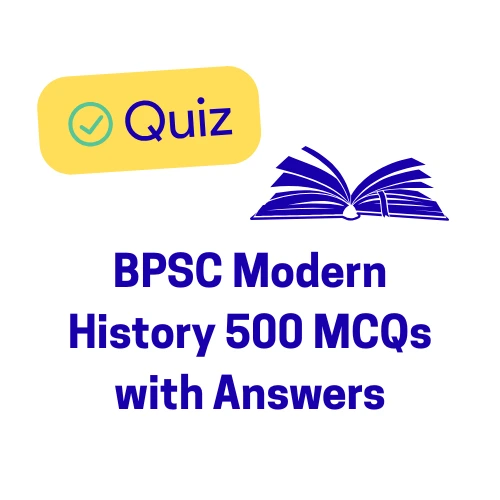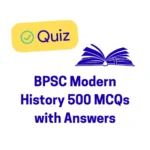BPSC Modern History Part 7 (500 MCQs) focus on the Forerunners of the INC and Early Associations of the 19th century, covering major organizations and reformers.
BPSC Modern History Part 7 (500 MCQs)
Section O: Forerunners of the INC and Early Associations
Q181. Which organization, established in 1838, is considered the first political association in India?
(A) British Indian Association
(B) Landholders’ Society
(C) East India Association
(D) Indian League
Q182. The East India Association was founded in London in 1866 by which prominent Indian leader to discuss the Indian question and influence public opinion in England?
(A) Surendranath Banerjee
(B) Dadabhai Naoroji
(C) W. C. Bonnerjee
(D) A. O. Hume
Q183. The Indian Association of Calcutta (1876), which organized a strong movement against the lowering of the age limit for the Civil Services Examination, was founded by:
(A) Anand Mohan Bose and Surendranath Banerjee
(B) Sisir Kumar Ghosh
(C) M. G. Ranade
(D) W. C. Bonnerjee
Q184. Who founded the Indian League in 1875 to promote the sense of nationalism among the people and encourage political education?
(A) Sisir Kumar Ghosh
(B) B. G. Tilak
(C) V. D. Savarkar
(D) Lala Lajpat Rai
Q185. Which of the following British Viceroys is associated with introducing the Arms Act (1878) and the infamous Vernacular Press Act (1878)?
(A) Lord Ripon
(B) Lord Lytton
(C) Lord Canning
(D) Lord Curzon
BPSC Modern History Part 7 (500 MCQs)
Q186. The Vernacular Press Act of 1878 was repealed in 1882 by which Viceroy, earning him the title of ‘Father of Local Self-Government’ in India?
(A) Lord Dufferin
(B) Lord Elgin
(C) Lord Ripon
(D) Lord Lansdowne
Q187. The Ilbert Bill Controversy (1883) was related to which issue?
(A) Allowing Indian judges to try cases involving European subjects.
(B) Reduction of the age limit for the Civil Services Examination.
(C) Introduction of the Arms Act.
(D) Allocation of funds for education.
Q188. Which year saw the convening of the first Indian National Conference, organized by the Indian Association, which is considered a precursor to the INC?
(A) 1876
(B) 1883
(C) 1885
(D) 1887
Q189. The ‘Drain of Wealth’ theory, which exposed the economic exploitation of India by the British, was primarily propounded by:
(A) Dadabhai Naoroji
(B) R. C. Dutt
(C) G. V. Joshi
(D) All of the above
Q190. Which book by Dadabhai Naoroji elaborated on the ‘Drain Theory’?
(A) Poverty and Un-British Rule in India
(B) Economic History of India
(C) Speeches and Writings
(D) Indian Famines: Their Causes and Remedies
Section P: Formation of the Indian National Congress (INC)
Q191. The Indian National Congress (INC) was formed in 1885 by A. O. Hume, a retired civil servant. Who was the Viceroy of India at the time of its formation?
(A) Lord Dufferin
(B) Lord Ripon
(C) Lord Canning
(D) Lord Northbrook
Q192. The first session of the Indian National Congress was held in which city?
(A) Calcutta
(B) Bombay (Gokuldas Tejpal Sanskrit College)
(C) Poona
(D) Madras
Q193. Who presided over the first session of the INC in 1885?
(A) Dadabhai Naoroji
(B) A. O. Hume
(C) W. C. Bonnerjee
(D) Surendranath Banerjee
Q194. Which historian/writer proposed the ‘Safety Valve Theory’ regarding the formation of the Indian National Congress?
(A) R. C. Majumdar
(B) Lala Lajpat Rai
(C) Bipan Chandra
(D) V. D. Savarkar
Q195. Which was the first INC session to be presided over by a Muslim President, and who was that President?
(A) 1885, W. C. Bonnerjee
(B) 1886, Dadabhai Naoroji
(C) 1887 (Madras), Badruddin Tyabji
(D) 1888 (Allahabad), George Yule
Q196. Who was the first English President of the INC?
(A) A. O. Hume
(B) W. C. Bonnerjee
(C) George Yule
(D) Alfred Webb
Q197. Which Moderate leader was elected as the President of the INC three times?
(A) Surendranath Banerjee
(B) Dadabhai Naoroji
(C) Pherozeshah Mehta
(D) G. K. Gokhale
Q198. The INC session that was attended by the maximum number of delegates (2000+) was held in which city?
(A) Bombay (1885)
(B) Calcutta (1890)
(C) Nagpur (1891)
(D) Poona (1895)
Q199. Who was the Viceroy who famously called the INC a “microscopic minority”?
(A) Lord Curzon
(B) Lord Dufferin
(C) Lord Lansdowne
(D) Lord Elgin II
Q200. The first woman graduate of Calcutta University to address the INC session (1890) was:
(A) Kadambini Ganguly
(B) Annie Besant
(C) Sarojini Naidu
(D) Pritilata Waddedar
Section Q: The Moderate Phase (1885-1905)
Q201. The early phase of the INC (1885-1905) is known as the Moderate Phase due to their reliance on which method of agitation?
(A) Passive Resistance
(B) Constitutional Agitation (Prayers, Petitions, Protests)
(C) Revolutionary Terrorism
(D) Non-Cooperation and Civil Disobedience
Q202. Which of the following leaders was/were associated with the Moderate group of the INC?
Dadabhai Naoroji
Surendranath Banerjee
G. K. Gokhale
B. G. Tilak
(A) 1 and 2 only
(B) 1, 2, and 3 only
(C) 1, 3, and 4 only
(D) 1, 2, 3, and 4
Q203. The most important demand of the Moderates regarding political reform was:
(A) Complete Independence (Purna Swaraj)
(B) Dominion Status under the British Crown
(C) Expansion and reform of the Legislative Councils
(D) Immediate end to the Drain of Wealth
Q204. Which Moderate leader was the political guru of Mahatma Gandhi?
(A) Dadabhai Naoroji
(B) G. K. Gokhale
(C) Surendranath Banerjee
(D) Pherozeshah Mehta
Q205. The Moderates aimed at achieving which goal through their constitutional methods?
(A) Self-government within the British Empire (Dominion Status).
(B) Absolute independence from British rule.
(C) Formation of a socialist republic.
(D) Military revolt against the British.
BPSC Modern History Part 7 (500 MCQs)
Q206. The Indian Councils Act of 1892, which was a result of Moderate demands, was considered a disappointment by the leaders because:
(A) It did not grant the right to vote to Indians.
(B) It did not give the Council members the right to ask questions or discuss the budget.
(C) It did not introduce the principle of election directly.
(D) It introduced communal electorates.
Q207. The first major political controversy in which the Moderates found themselves on the defensive against the Extremists was the passing of the:
(A) Indian Councils Act, 1892
(B) Seditious Meetings Act, 1907
(C) Age of Consent Act, 1891
(D) Calcutta Corporation Act, 1899
Q208. The book ‘India Today’, which provided a Marxist analysis of Indian history and the nature of the INC, was written by:
(A) R. P. Dutt
(B) Bipan Chandra
(C) R. C. Majumdar
(D) Jawaharlal Nehru
Q209. Which Moderate leader founded the newspaper ‘The Bengalee’ and played a crucial role in the anti-Partition movement?
(A) Dadabhai Naoroji
(B) Surendranath Banerjee
(C) Pherozeshah Mehta
(D) B. G. Tilak
Q210. Which Moderate leader served as the President of the INC only once, presiding over the Benaras session of 1905, where the Swadeshi resolution was passed?
(A) Surendranath Banerjee
(B) Pherozeshah Mehta
(C) G. K. Gokhale
(D) R. C. Dutt

